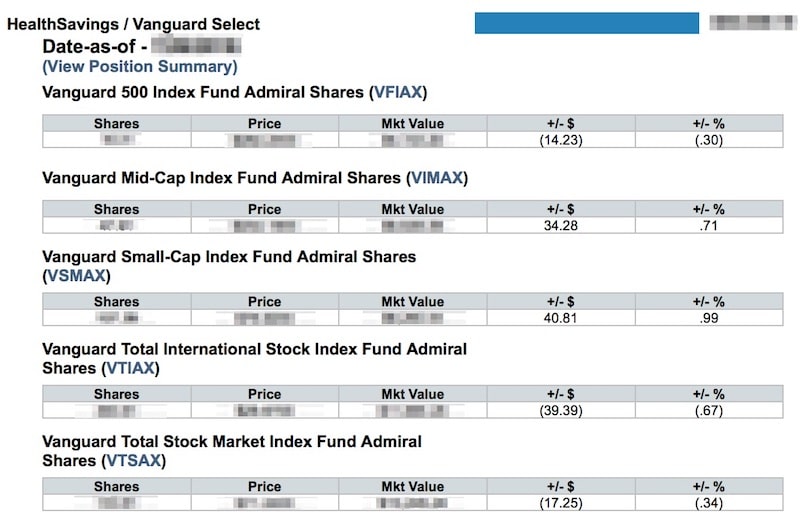The HSA is among my favorite investment accounts. HSA stands for Health Savings Account. It’s a tax-advantaged medical savings account. In many ways it behaves like a traditional IRA with the major difference being that the money can be used at any age for qualified medical expenses.You’re not restricted to only using it when you reach retirement age.
The only requirement to qualify for an HSA is enrollment in a high-deductible heath plan (HDHP). A HDHP offers lower insurance premiums but requires that the participant meet a higher deductible before the insurance begins covering healthcare expenses. The minimum deductible for a single person is $1,350. For a family, it’s $2,700. The maximum annual out-of-pocket expense is $6,650 and $13,300 for a single person and family respectively.
In a nutshell an HDHP shifts more of the up-front medical costs to the participant. This makes HDHPs better suited to people in relatively good health since they’ll be able to benefit from lower premiums while also gaining access to the HSA.
With the definitions out of the way, let’s dig into some of the HSA benefits.
Triple Tax Benefit
Pre-Tax HSA Contributions
Contributions are made with pre-tax dollars. This lowers your adjusted gross income (AGI) which is the same benefit provided to 401(k) and traditional IRA accounts. Lowering your AGI legally reduces your tax burden. Also, unlike the IRA, there are no income phase-out limits where you lose the tax deduction. You can earn $50,000 or $500,000 annually and you can still claim a tax deduction from your HSA contributions.
A single person is allowed to contribute $3,450 annually. A family can contribute up to $6,900 annually. You can find these numbers and the contribution limits for other retirement accounts in my cheatsheet.
Money Grows Tax-Free
Because the HSA is in many ways an IRA for healthcare expenses, any money contributed to the account grows tax-free over time. Most HSA accounts provide investment options such as index funds. This allows the participant to really accelerate how quickly the account grows.
There is often a requirement that the first $500 or $1000 contributed to an HSA must be kept in cash. Any dollars on top of that are allowed to be invested. Not all HSA accounts have this restriction so check with your provider to learn about any restrictions you may be subject to.
Pay For Medical Expenses with Tax-Free Dollars
This a big one. The HSA is only retirement-style investment account which allows the participant to use the money for medical expenses absolutely tax free. The money can be used to pay for doctor visit co-pays, prescription medicine, and any therapy you may be undergoing. A very extensive list of qualified and unqualified medical expenses can be found here. As you can see there’s a lot that HSA money can be legally used for.
It’s important to note that this benefit remains regardless of age. It doesn’t matter if you are 25 or 65. You are allowed to use HSA funds for qualified healthcare expenses without ever having paid taxes on the money.
Now what if you’re the kind of person that never gets sick? You reach retirement age and you don’t really need to regularly visit the doctor. At age 65, you are able to withdraw money from your HSA penalty-free. The only caveat is you will have to pay taxes on any funds not used for medical expenses. At age 65, your HSA essentially becomes like another IRA.
Can you now see why I think they’re awesomesauce?
Investment Options
Most HSA providers have some sort of investment option. These are usually restricted to mutual or index funds. Using your HSA contribution money for investing makes sense if you have reason to believe that you won’t need to use the money for healthcare expenses in the immediate future.
If things change and you do need the money, the investments can be sold making the cash proceeds available to cover expenses. The time from an investment being sold and cash being available is typically 3 – 5 business days.
How I Invest Using My HSA
I’m enrolled in a HDHP which provides me with access to an HSA. My employer is pretty awesome in that they contribute $1,500 towards the $6,900 annual limit. This $1,500 is contributed at an HSA provider they already have a relationship but the investment options there aren’t that great. Because there’s nothing in the IRS code that says the total contribution (in my case $6,900) must be made to a single account, I contribute the remaining $5,400 to a different HSA provider.
The HSA provider I use for my portion of the annual HSA contribution is called HealthSavings Administrators. They offer a wide range of investment options from Vanguard. Note that the investments are all from Vanguard’s “Admiral” class of funds. The Admiral class funds have extremely low expense ratios; in many cases less than %0.10. Gaining access to these funds usually requires an initial minimum investment of $10,000. The $10,000 requirement is waived when making contributions with HealthSavings Administrators.

HealthSavings Administrators Portfolio
Outside of the fund expense ratio, the only other cost is an annual $45.00 account maintenance and record-keeping fee. Not bad.
To recap, I have a total contribution of $6,900 available for this calendar year. My employer makes a $1,500 contribution to the health savings company they have a relationship with. The remaining $5,400 I contribute to my HealthSavings Administrator account to reach the $6,900 annual contribution limit. The investments allow me to grow the account over time while still providing the flexibility to cover healthcare expenses.
I hope this has provided enough information to help determine if an HSA is right for you. I find it extremely attractive that they provide the ability to cover healthcare expenses now while building up a future nest egg.
For additional help to determine if you qualify for an HSA and to see a list of providers, try out this HSA tool.